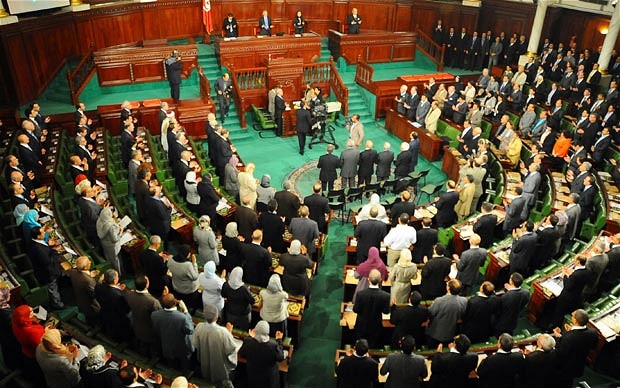
The National Constituent Assembly of Tunisia this week begins plenary debate on the most recent draft of the republic’s new constitution, a document that has achieved a broader consensus upon each iteration.
The third draft (in retrospect, misleadingly referred to as the final draft) reflected a consensus among the assembly members on the constitutional coordinating committee. That draft was referred to a team of legal experts—including Yadh Ben Achour, formerly of the High Commission for Political Reform—and, more importantly, a national dialogue assembly by President Moncef Marzouki. Marzouki’s national dialogue brought together major political leaders inside and outside the assembly, including Rached Ghannouchi, the president of Ennahdha, the self-proclaimed Islamic party, and Beji Caid Essebsi, the octogenarian president of the secular opposition party Nida Tunis formed in June 2012.
Many of the most vocal figures at the national dialogue, including Ghannouchi and Essebsi, are not elected, but rather sent as representatives of their political parties. Essebsi’s invitation was more tenuous since his party formed only after the elections for the constituent assembly, meaning that Nida Tunis has no seats in the elected body. Nevertheless, the national dialogue negotiations made significant changes to the draft constitution, which to this point had at least formally been drafted only by assembly members.
The last weeks’ amendments to the draft are a win for the secular opposition. Since the beginning of the debate, Ennahdha has favored a parliamentary system of government with a strong prime minister and a weak president. The latest draft solidifies the powerful role of a president with an exclusive mandate over national defense, national security, and foreign relations. The president can also veto legislation and has a new role in forming the government in the case of stalled parliamentary negotiations. Given that the prime minister has the leeway to direct domestic policy, the draft constitution created a blueprint for conflict between the prime minster and the president—exacerbated if the president and prime minister are elected from different political parties.
Nor can Ennahdha claim any victory on questions of the state’s Islamic identity, another one of the party’s priorities. The draft builds on “moderate objectives of Islam” (preamble), and maintains that state’s “religion is Islam” (Article 1) and that the state “sponsors religion” (Article 6), but it does not include language that Islam or Islamic identity is “protected,” which some Ennahdha members preferred. Members of the Shura Council of Ennahdha, as well as Ennahdha members of the assembly, were disappointed that Ghannouchi could not extract concessions from secular groups on either executive powers or on Islamic identity. Ennahdha assembly members have demonstrated a high degree of party loyalty, however, and likely will support the draft en masse since it was endorsed by the Shura Council. Eighty-seven votes from Ennahdha put the constitution well on its way to the 144 votes (two-thirds plus one) needed for passage. (Each article of the constitution must first be approved by a simple majority. The plenary then has two chances to pass the constitution with a two-thirds vote; if it fails both times, then the constitution goes to a public referendum, the results of which can override the assembly with 50 percent approval.)
Secular parties in the assembly are more disparate and have not demonstrated the same tendency to vote in blocs, making it difficult to assess the likelihood of two-thirds approval in the assembly. A group of 60 mostly secular assembly members, for example, announced on June 17 that they would oppose the constitution. Some of these members might be persuaded during the debate, but the disparate nature of secular parties could empower holdouts. Still, secular groups should be quite satisfied with the current shape of the draft, and with Ennahdha signaling support for, and even willingness to, compromise, it is a safe bet that the assembly will approve the constitution by a two-thirds majority and avoid a divisive referendum.
The plenary debate begins this week and will continue through Ramadan into August 2013. Mustafa Ben Jaafar, the assembly president, expects the first vote on the full draft around mid-August, raising expectations that the constitution might be finished by September. As always, the assembly’s legislative docket, which now includes appointments to the independent elections commission and a law that would exclude senior officials from the ancien regime, could interfere with the constitutional debate. But as it stands, legislative and presidential elections under the new constitution are possible by the end of the year. Plenary debates on the constitution and other legislation will be contentious which, in the foreground of increasingly partisan politics, suggest that Tunisia is entering a divisive phase of the transition to democracy.
Duncan Pickard is a nonresident fellow at the Rafik Hariri Center for the Middle East. He is based in Berlin and North Africa.
Photo: AP/Hassene Dridi
Image: Constituent%20Assembly%20of%20Tunisia.jpg
